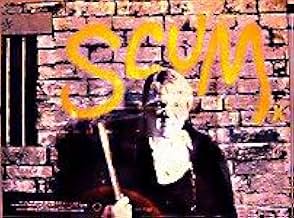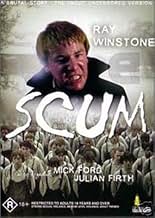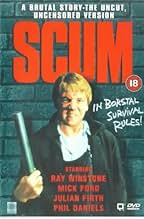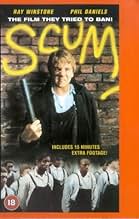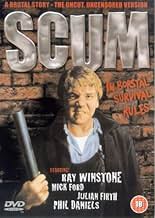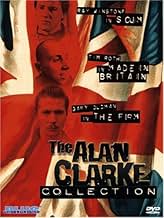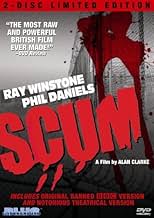An uncompromising story of life in a British juvenile offender institution in the '70s.An uncompromising story of life in a British juvenile offender institution in the '70s.An uncompromising story of life in a British juvenile offender institution in the '70s.
Philip DaCosta
- Jackson
- (as Philip Da Costa)
- Director
- Writer
- All cast & crew
- Production, box office & more at IMDbPro
Featured reviews
Scum (the screenplay) was originally banned in 1977 - the year it was made - on the instructions of the BBC who had commissioned it. This was on the grounds of it being both too realistic in its presentation and simultaneously a work of fiction. The film follows the progression of three boys at borstal (prison for males ages 11-16) from arrival to the social dominance of one of them. It's a blackly humorous and scathing study of the (physical *and* mental) violence inherent in any social system, and particularly in the 'justice' system.
The screenplay was remade as a feature film in 1979, starring most of the original cast and featuring most of the original script, although a couple of scenes (featuring sexual abuse, though physical and racial abuse were deemed acceptable...) were presumably cut from the script because they wouldn't pass even the BBFC censor.
The original screenplay has subsequently been shown on UK television once. I happened to have the video running. With a high-quality tape in it. Lucky, that! It compares very favourably to the film, though the film format appears inferior (lower budget at the BBC), the quality of the performances is possibly better.
Scum is one of the most important screenplays to have been made, and shown, on British television, because it reveals the changing attitudes of the censors, and the nature of political censorship in the UK.
The film itself does not reveal this history.
The screenplay was remade as a feature film in 1979, starring most of the original cast and featuring most of the original script, although a couple of scenes (featuring sexual abuse, though physical and racial abuse were deemed acceptable...) were presumably cut from the script because they wouldn't pass even the BBFC censor.
The original screenplay has subsequently been shown on UK television once. I happened to have the video running. With a high-quality tape in it. Lucky, that! It compares very favourably to the film, though the film format appears inferior (lower budget at the BBC), the quality of the performances is possibly better.
Scum is one of the most important screenplays to have been made, and shown, on British television, because it reveals the changing attitudes of the censors, and the nature of political censorship in the UK.
The film itself does not reveal this history.
The story on which Scum is based was originally penned to be a part of a BBC series 'Play For Today' but was not shown at the time. It was made into a film two years later by Alan Clarke; and the reason it was not shown earlier is clear to see; as Scum is a shocking and unflinching account of life in Britain's now defunct Borstal system. The film is gritty and realistic and features no shortage of violence, so it's hardly a surprise that it didn't go down particularly well with Britain's conservative film censors. The film revolves around a young offender's institution in Britain. The place is shook up upon the arrival of a young man named Carlin. Carlin was moved from another institution for fighting with a guard, and arrives with his reputation already in front of him. He soon finds out how the prison works and quickly seeks to take out "the daddy" and his cronies to take control of the place himself.
Ray Winstone would go on to have a good career playing hard man types; and this is where it all started. The actor has a much younger look about him than the grizzled actor many will know better; but he still fits the bill well here and is always believable in his role. The film also features a number of faces that will be familiar to anyone who knows anything about British TV. Scum doesn't just rely on violence to deliver its shocks; the whole atmosphere of the central location is thoroughly grim and the guards' attitude towards the inmates does not inspire confidence in the system that the film is portraying. The film does not generally directly expose the flaws of the prison system; although this is given some attention by way of Mick Ford's Archer character; that cleverly condemns the system through dialogue. The story runs smoothly for the first two thirds of the film, while the final third is dedicated to the film's most shocking scenario; a sequence of events that is most likely, from anything in the film, to stay with the viewer once the film is over. Overall, this is an excellent little film that deserves to be viewed by anyone that considers themselves a fan of wayward cinema.
Ray Winstone would go on to have a good career playing hard man types; and this is where it all started. The actor has a much younger look about him than the grizzled actor many will know better; but he still fits the bill well here and is always believable in his role. The film also features a number of faces that will be familiar to anyone who knows anything about British TV. Scum doesn't just rely on violence to deliver its shocks; the whole atmosphere of the central location is thoroughly grim and the guards' attitude towards the inmates does not inspire confidence in the system that the film is portraying. The film does not generally directly expose the flaws of the prison system; although this is given some attention by way of Mick Ford's Archer character; that cleverly condemns the system through dialogue. The story runs smoothly for the first two thirds of the film, while the final third is dedicated to the film's most shocking scenario; a sequence of events that is most likely, from anything in the film, to stay with the viewer once the film is over. Overall, this is an excellent little film that deserves to be viewed by anyone that considers themselves a fan of wayward cinema.
I have seen this film once, and that should be enough for many people, yet they probably will have an urge to see it again and see the actors who are now making bigger, slicker movies (Cat off Red Dwarf in Blade 2 and Ray Winstone in everything!)
As it is about people around my age, this film hit me even harder. The rape scene counts as being the most sickening scene in movie scene history, yet it is all integral to the story. It is extremely bloody, racist and yet moving and heartbreaking. Ray Winstone is a cruel revelation as a top dog,a sympathetic yet violent hoodlum. Never been better since, I think.
The film moves at a breakneck speed and never seems to sag. I don't know what those employed at a borstal will think of it, but it would probably make them think more of the broken-down urchins as human.
A hard film to like, but even harder to forget. If I was rating it, a 3/5. I think I would give it a five if it wasn't so stomach-churningly realistic. Violence in films can be entertaining, but on no account this time.
As it is about people around my age, this film hit me even harder. The rape scene counts as being the most sickening scene in movie scene history, yet it is all integral to the story. It is extremely bloody, racist and yet moving and heartbreaking. Ray Winstone is a cruel revelation as a top dog,a sympathetic yet violent hoodlum. Never been better since, I think.
The film moves at a breakneck speed and never seems to sag. I don't know what those employed at a borstal will think of it, but it would probably make them think more of the broken-down urchins as human.
A hard film to like, but even harder to forget. If I was rating it, a 3/5. I think I would give it a five if it wasn't so stomach-churningly realistic. Violence in films can be entertaining, but on no account this time.
The grandaddy of 'incarceration' films - this is one of the best, oft copied but never bettered.
I liked it because it's so damn British. The one liners are legion; you all know what they are and where, but among a stellar list 'Mecca, Archer' rises just above and never fails to have me in fits. The way Goodyear looks at the Governor just after this great outburst is also revealing; as is the look of satisfaction on Archer's face when he finally succeeds in riling the 'religious maniac'.
Of course, there's a serious message in here; expedited best in the conversation between Archer and Mr Duke over 'coffee'. Analysing the situation, as Archer attempts to do, will simply not be tolerated and is interpreted as dissent by a man who embodies the 'system' and is intellectually and emotionally unequipped to deal with his own, and the State's ultimate failure to deliver.
Like true class acts, this film works on several levels; it's a no nonsense drama bedecked with Taj Mahal one liners everyone loves, yet it also works on a deeper level; you cannot punitively 'correct' all offenders with violence and cruelty. You are not corrected, you are merely broken, as Davis and Toyne are. If you're not broken, you run amok, but the point is you're not 'cured'.
When this film was on TV in 1983, just after Channel Four started broadcasting, they edited the notorious potting shed sequence to such an extent that the heinous act committed was virtually excised, thereby diluting the dramatic effect to virtually zero. Interestingly enough, they also edited out the bit where Mr Greaves ignores Davis' second press of the bell. Why? Presumably because they feared the ire of the State at the highlighting of its inadequacies? I suppose they can be forgiven, Channel Four was new then after all, but it's quite revealing nonetheless.
If I'm home alone, I quote this film as I'm wandering around the house. I don't quite know why. It's all about the importance of individuality, standing up for yourself and not just 'accepting' things. That's probably the reason. Now, where's your tool?
I liked it because it's so damn British. The one liners are legion; you all know what they are and where, but among a stellar list 'Mecca, Archer' rises just above and never fails to have me in fits. The way Goodyear looks at the Governor just after this great outburst is also revealing; as is the look of satisfaction on Archer's face when he finally succeeds in riling the 'religious maniac'.
Of course, there's a serious message in here; expedited best in the conversation between Archer and Mr Duke over 'coffee'. Analysing the situation, as Archer attempts to do, will simply not be tolerated and is interpreted as dissent by a man who embodies the 'system' and is intellectually and emotionally unequipped to deal with his own, and the State's ultimate failure to deliver.
Like true class acts, this film works on several levels; it's a no nonsense drama bedecked with Taj Mahal one liners everyone loves, yet it also works on a deeper level; you cannot punitively 'correct' all offenders with violence and cruelty. You are not corrected, you are merely broken, as Davis and Toyne are. If you're not broken, you run amok, but the point is you're not 'cured'.
When this film was on TV in 1983, just after Channel Four started broadcasting, they edited the notorious potting shed sequence to such an extent that the heinous act committed was virtually excised, thereby diluting the dramatic effect to virtually zero. Interestingly enough, they also edited out the bit where Mr Greaves ignores Davis' second press of the bell. Why? Presumably because they feared the ire of the State at the highlighting of its inadequacies? I suppose they can be forgiven, Channel Four was new then after all, but it's quite revealing nonetheless.
If I'm home alone, I quote this film as I'm wandering around the house. I don't quite know why. It's all about the importance of individuality, standing up for yourself and not just 'accepting' things. That's probably the reason. Now, where's your tool?
I've now seen this movie several times, although admittedly watching it can hardly be classed as a 'pleasure'. Alan Clarke made this feature after his TV play from two years earlier was banned, and perhaps had more freedom here to explore the issues.
Carlin (an early, showy appearance from Ray Winstone) is sent to Borstal where he quickly establishes himself as a tough boy with a regime of strength. Typical Winstone performance in many ways. In the prison with him are his shadow Richards (played by Phil Daniels); cynical, bare-footed Archer (Mick Ford, these days more often seen the other side of the law in such dramas as 'Silent Witness'); black inmate Angel (Davidson Knight); and quiet Davis, the boy who gets picked on for being a loner (a quite staggering performance from Julian Firth, who never really lived up to this early promise).
Scum is uncompromising - violent (there's a rape which leaves little to the imagination, a suicide, several fights); scathing in its condemnation of the 'system' (which thankfully is not like this now) - and yet finds time for character development and convincing plot. Without any music it is purely presented in documentary style, matter-of-fact 'this is how it is'.
Not a fun movie, but one which tries to make a point, and, if nothing else, has the power to shock and make you remember certain sections for a long time after viewing. Recommended.
Carlin (an early, showy appearance from Ray Winstone) is sent to Borstal where he quickly establishes himself as a tough boy with a regime of strength. Typical Winstone performance in many ways. In the prison with him are his shadow Richards (played by Phil Daniels); cynical, bare-footed Archer (Mick Ford, these days more often seen the other side of the law in such dramas as 'Silent Witness'); black inmate Angel (Davidson Knight); and quiet Davis, the boy who gets picked on for being a loner (a quite staggering performance from Julian Firth, who never really lived up to this early promise).
Scum is uncompromising - violent (there's a rape which leaves little to the imagination, a suicide, several fights); scathing in its condemnation of the 'system' (which thankfully is not like this now) - and yet finds time for character development and convincing plot. Without any music it is purely presented in documentary style, matter-of-fact 'this is how it is'.
Not a fun movie, but one which tries to make a point, and, if nothing else, has the power to shock and make you remember certain sections for a long time after viewing. Recommended.
Did you know
- TriviaCarlin was originally a Glaswegian, but was changed into a Cockney when Alan Clarke saw a then-unknown Ray Winstone walk in a unique way.
- GoofsAll borstal inmates were subject to the same mandatory short-back-and-sides haircut, yet a vast array of hairstyles are shown throughout the film, including afros.
- Alternate versionsNorwegian cinema version was cut in the rape scene and the suicide scene. Later video versions are uncut.
- ConnectionsFeatured in The South Bank Show: Keith Jarrett/Scum (1979)
- SoundtracksDirty Last Night
(uncredited)
Music by John Dickson and Elfed Hayes
De Wolfe Music Ltd
- How long is Scum?Powered by Alexa
Details
- Release date
- Country of origin
- Official site
- Language
- Also known as
- Scum - Abschaum
- Filming locations
- Shenley Mental Hospital, Shenley, Hertfordshire, England, UK(Borstal Prison)
- Production companies
- See more company credits at IMDbPro
Box office
- Budget
- £250,000 (estimated)
- Gross US & Canada
- $6,461
- Opening weekend US & Canada
- $1,948
- Jun 18, 2017
- Gross worldwide
- $6,461
- Runtime1 hour 38 minutes
- Sound mix
- Aspect ratio
- 1.66 : 1
Contribute to this page
Suggest an edit or add missing content



